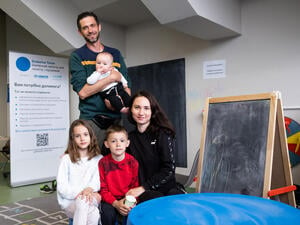Three hours too late
Three hours too late

With his youngest son Yusef in his arms, Syrian refugee Monzir has reached safety in Greece but says he worries about what the EU-Turkey will mean for his family's future.
LESVOS, Greece, April 4 (UNHCR) - It was in the early hours of a March morning when Monzir's rubber dinghy bumped against the shores of Lesvos, but it was already too late.
At midnight that day (March 20), the status of arrivals like Monzir, who have fled war and spent their life savings to chance a boat trip to Europe, underwent a seismic shift.
Three hours too late, Monzir found himself behind fences topped with coils of razor-wire in Moria, a detention facility where he awaits a possible return to Turkey.
Gathering his youngest son Yusef in his arms and clasping him to his chest, Monzir talked about the short journey across the dangerous stretch of sea between Turkey and the Greek island.
"We all thought we would drown. The boat was just a piece of plastic, we thought it would be torn apart (by the waves)," he said in tears. "This was my first… and hope last time on such a boat."
The March agreement between the EU and Turkey is an attempt to stem the numbers of refugees landing on Europe's shores, which has increased more than 17-fold compared to the same period in 2015.
Under the deal, all new arrivals are being kept in detention until their asylum claims are assessed. UNHCR, the UN Refugee Agency, is not party to the EU-Turkey deal and maintains that such an arrangement, in order to be consistent with international and European refugee and human rights law, must include clearly spelt out protection safeguards, both in Greece (where individual claims must be properly assessed) and in Turkey..
UNHCR has also warned that Greece is under-prepared and ill-equipped to manage the situation.
"Greece still does not have sufficient capacity on (the Greek islands) to process large numbers of asylum claims," says Boris Cheshirkov, a UNHCR spokesperson.
UNHCR is opposed to mandatory detention of asylum-seekers and has urged the Greek Government to provide alternatives to detention, Cheshirkov added.
Since March 20, when detention of new arrivals began, UNHCR has suspended activities in closed centres and is now focusing on providing information on asylum, identifying people at heightened risk, such as pregnant women, elderly, and torture survivors and monitoring procedures and conditions. On the shoreline,in the ports, and in open reception centres, UNHCR maintains assistance activities, alongside volunteers,NGOs and the Government.
Monzir's boat was the first to land on Lesvos after the agreement took effect.
Eight months ago his wife, and a son, Mohammed, and a daughter, Jawahar, fled to Germany.
Bombs had hit his home in Ariha, Syria, destroyed his brother's house and flattened the whole neighbourhood, including his son's school.
The former policeman was forced to live with remaining family members in a 3 metre-deep hole in the ground, emerging for only one hour a day to cook and eat. His right eye is marked by lumpy scar tissue where bomb shrapnel had chipped away part of his skull.
Monzir's eldest son Ismail,17, was arguably lucky. He travelled independently and arrived on Lesvos around March 8. He is now waiting in a camp near Drama on the Greek mainland, with around 50,000 other refugees and migrants. They are all uncertain about what the future holds.
Monzir and what remained of his immediate family finally fled after he saw images of militants allegedly slaughtering children on TV and Facebook.
They headed north-west towards the Turkish border.
Monzir paid a smuggler $1,000 to help the family walk six hours through the mountains to Turkey. It was an arduous hike, but it wasn't difficult to keep his family motivated.
"Would you stay and risk death or continue walking? Of course we walked," he said.
From Antakya in southern Turkey they boarded a bus to coastal town of Izmir, where he again paid smugglers - this time €1,200 for each family member to board a boat heading for the distant twinkling lights of Lesvos. Late in the evening of March 20, they set sail into the darkness.
"We were supposed to meet in Greece or in another European country," said Monzir. "I don't want anything more, just to be reunited with my children."
UNHCR hopes that, in accordance with EU law, Monzir and his sons will be able to reunite with his wife and children who are already in Germany.
Monzir added: "In Syria I was a prisoner of the war. I escaped so I can be free, but now again, I'm in jail. Even if they only give me a tent on a mountain, I just want to live with my kids in peace."
By Hereward Holland, Lesvos, Greece








